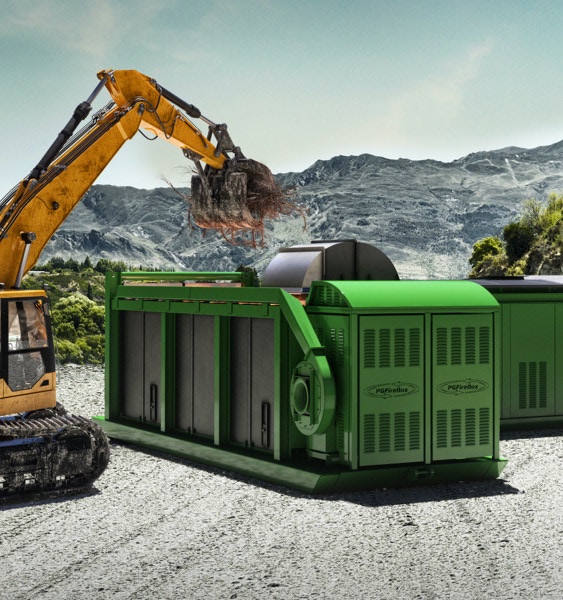How Air Burners Can Help Reduce Your Carbon Footprint
What if we told you we could help reduce your carbon footprint and business costs? Pull up a chair because that's exactly what we're about to do.
Transporting biomass waste to landfills, chip mills, or incinerators is a heavy burden on operations and the environment. Air Burners eliminates wood waste onsite—cleanly and cost-effectively. There's no chipping or hauling, which means no costly fuel trips, disposal charges, or tipping fees. It turns out that going green makes great business and environmental sense. Let Air Burners help you take a big step toward reducing your carbon footprint.
We're in the business of helping yours.
The FireBox is the world's most proven above-ground, self-contained air curtain burner. There's no better way to get rid of wood waste on the planet. The portable, easy-to-maneuver FireBox arrives fully assembled, ready to work on or off-site.
Tons of savings.
Who knew that eliminating wood waste could help eliminate business costs? We did. And we're passing it along to you. All the back and forth between chipping mills, landfills, and incinerators mean you'll spend a lot of time and money—the lowest cost being $3,500 to dispose of 100 tons of biomass waste. The cost to the environment can be even greater.
Trucks burn a lot of diesel fuel. The longer the haul and heavier the load, the more carbon dioxide, methane, and other greenhouse gases get spewed and spit into our air.
The chipping process is anything but good. First, there aren't many uses for chipped wood other than mulch. Second, turning waste into chips burns up to 60 gallons of diesel per hour and emits cancer causing dust particles. Not very good for your carbon footprint score.
The typical uncontrolled, open burn unleashes black smoke particulates that pollute our air and damage the ecosystem. What's more, it takes 48 hours to eliminate 20 tons. That's a lot of time and a lot of harm. It's not difficult to see how incineration isn't good for anyone's carbon footprint.
Biogenic vs. Non-Biogenic CO2
There are two kinds of carbon dioxide. The type Mother Nature makes—biogenic carbon—and the kind we make—non-biogenic carbon when we burn fossil fuels like oil, gas, and coal.
Environmental agencies and scientists know the natural biogenic carbon released into the atmosphere through the natural decomposition of trees, plants, and other vegetative waste isn't a threat to the environment.
The real threat is man-made (manufactured) CO2 from processing biomass waste. We design Air Burners machines to burn less diesel fuel and eliminate hauling and chipping. The less fuel we use to eradicate wood waste, the more our environment—and carbon footprint benefit. Reducing fuel input lowers business costs and pays off in a healthier, greener world.
Your carbon footprint gets smaller while your business savings get bigger.
We generate millions of tons of biomass waste every year but recycle just 29%. What remains is either burned or hauled to landfills.
Air Burners revolutionized biomass waste disposal with FireBox—the most cost-efficient, environmentally-friendly way to get rid of wood waste. The air curtain pollution-control technology burns 40x faster than open burning while trapping and significantly reducing particulate matter, like black carbon, by 98%. After the burn, 2% biochar remains, a nutrient-rich carbon ash you can mix with the soil or sell. The diesel-powered machine uses less than 3 gallons of fuel per hour and accepts whole trees, slash piles, logs, root balls, vines, and wooden crates.
Do more than survive—thrive.
Air Burners commitment to developing eco-friendly, cost-efficient solutions has helped businesses reduce their carbon footprint while increasing their success. Air Burners commitment to producing ecofriendly, cost-efficient solutions has helped companies lower operating costs and reduce their carbon footprint.
Take the next step and discover more about Air Burners and what our machines can do to help improve your carbon footprint.
